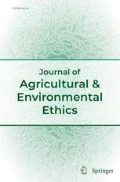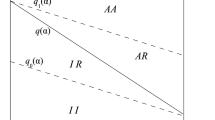Abstract
Climate change and many environmental problems are caused by the accumulated effects of repeated actions by multiple individuals. Instead of relying on collective responsibility, I argue for a non-atomistic individual responsibility towards such environmental problems, encompassing omissions, ways of life, and consequences mediated by other agents. I suggest that the degree of causal responsibility of the agent must be balanced with the degree of capacity-responsibility determined by the availability of doable alternatives. Then, the more an agent has powers as a group member, the more she is responsible to design the social structure and the infrastructures of the group towards sustainability. Finally, one can hold another agent responsible only if the accused is not in a vulnerable position and if she is capable to take reparative and adaptive actions.
Similar content being viewed by others
Notes
I use the feminine as gender neutral.
This list of questions is inspired by Nancy Fraser who describes three abnormalities of justice with the questions What, Who and How, 2008.
Attfield already suggested that responsibility can be mediated through the actions of others, spatial and temporal distances, uncertainty and diffusion. I use the word mediated in a more limited meaning, restricted to mediation by other agents.
References
Attfield, R. (2009). Mediated responsibilities, global warming and the scope of ethics. Journal of Social Philosophy,40(2), 225–236.
Bayart, J.-F. (1996). L’illusion identitaire. Paris: Librairie Arthème Fayard.
Caney, S. (2005). Cosmopolitan justice, responsibility, and global climate change. Leiden Journal of International Law,18(4), 747–775.
Corlett, J. A. (2001). Collective moral responsibility. Journal of Social Philosophy,32, 573–584.
Cripps, E. (2013). Climate change and the moral agent, individual duties in and interdependent world. Oxford: Oxford University Press.
Cullity, G. (2015). Acts, omissions, emissions. In Moss (Ed.), Climate change and justice (pp. 148–164). Cambridge: Cambridge University Press.
Droz, L. (2019). Transnational civil disobedience as a catalyst for sustainable democracy. In H. Takikawa (Ed.), Rule of Law and Democracy – 12th Kobe Lecture IVR Congress Kyoto 2018, ARSP, pp. 123–134.
Feinberg, J. (1970). Doing and deserving, essays in the theory of responsibility. Princeton: Princeton University Press.
Fischer, J., & Ravizza, M. (1998). Responsibility and control, a theory of moral responsibility. Cambridge: Cambridge University Press.
Fletcher, G. P. (1996). Blackwell companions to philosophy. Hoboken: Wiley-Blackwell
Fraser, N. (2008). Abnormal justice. Critical Inquiry,34(3), 393–422.
Geertz, C. (1993). The interpretation of cultures: selected essays. London: Fontana Press.
Glazebrook, T. (2010). Myths of climate change: Deckchairs and development. In R. Irwin (Ed.), Climate change and philosophy, transformational possibilities (pp. 162–180). London: Continuum Studies in Philosophy.
Golding, M. P. (2005). Responsibility. In M. Golding & W. Edmundson (Eds.), The blackwell guide to the philosophy of law and legal theory (pp. 221–235). Hoboken: Blackwell Publishing.
Hart, H. L. A. (1961). The concept of law. Oxford: Oxford University Press.
Hart, H. L. A. (1968). Punishment and responsibility, essays in the philosophy of law. Oxford: Oxford University Press.
Haslanger, S. (2015). Distinguished lecture: Social structure, narrative and explanation. Canadian Journal of Philosophy,45(1), 1–15.
Haslanger, S. (2018). What is a social practice. The Royale Institute of Philosophy Supplement,82, 231–247.
Hiller, A. (2011). Climate change and individual responsibility. The Monist,94(3), 349–368.
Jax, K., et al. (2013). Ecosystem services and ethics. Ecological Economics,93, 260–268.
Jonas, H. (1979). Das prinzip verantwortung: Versuch einer ethik für die technologische zivilisation. Frankfurt am Main: Insel Verlag.
Kent, J. (2009). Individualized responsibility and climate change: “if climate protection becomes everyone’s responsibility, does it end up being no-one’s?”. Cosmopolitan Civil Societies Journal,1(3), 132–149.
Kollmuss, A., & Agyeman, J. (2002). Mind the gap: Why do people act environmentally and what are the barriers to pro-environmental behavior? Environmental Education Research,8(3), 239–260.
Kutz, C. (2002). Responsibility. In J. L. Coleman, K. E. Himma, & S. J. Shapiro (Eds.), Oxford handbook of jurisprudence and philosophy of law (pp. 548–587), Oxford University Press.
Kutz, C. (2007). Causeless complicity. Criminal Law and Philosophy,1, 289–305.
Larrère, C. (2014). Vulnérabilité et responsabilité: Un autre Jonas? Alter,22, 181–193.
Lawford-Smith, H. (2012). The feasibility of collectives’ actions. Australasian Journal of Philosophy,90(3), 453–467.
Lawford-Smith, H. (2016). Difference-making and individuals’ climate-related obligations. In H. Clare & D. Roser (Eds.), Climate justice in a non-ideal world (pp. 64–82). Oxford: Oxford University Press.
Maniates, M. F. (2001). Individualization: Plant a tree, buy a bike, save the world? Global Environmental Politics,1, 2.
May, L. (1991). Metaphysical guilt and moral taint. In L. May & S. Hoffman (Eds.), Collective responsibility: Five decades of debate in theoretical and applied ethics (pp. 239–254). Savage: Rowman & Littlefield.
McGary, H. (1991). Morality and collective liability. In L. May & S. Hoffman (Eds.), Collective responsibility: Five decades of debate in theoretical and applied ethics (pp. 77–87). Savage: Rowman & Littlefield.
Miller, D. (2004). Holding nations responsible. Ethics,114, 240–268.
Morgan-Knapp, C., & Goodman, C. (2015). Consequentialism, climate harm and individual obligations. Ethic Theory Moral Practice,18, 177–190.
Parfit, D. (1984). Reasons and persons. Oxford: Oxford University Press.
Parkin, S. (2010). The positive deviant. London: Earthscan.
Räthzel, N., & Uzzell, D. (2009). Changing relations in global environmental change. Global Environmental Change,19, 326–335.
Reiff, M. (2008). Terrorism, retribution, and collective responsibility. Social Theory and Practice,28(3), 442–455.
Samuel, S. (1997). Relationships and responsibilities. Philosophy & Public Affairs,26(3), 189–209.
Schmidt, J. J., Brown, P. G., & Orr, C. J. (2016). Ethics in the anthropocene: A research agenda. The Anthropocene Review,3(3), 188–200.
Shue, H. (1995). Avoiding necessity: Global warming, international fairness, and alternative energy. In I. Shapiro & W. DeCew (Eds.), Theory and practice, NOMOS XXXVII (pp. 239–264). New York: NYU Press.
Shue, H. (1999). Global environment and international inequality. International Affairs,75(3), 531–545.
Smiley, M. (2017). Collective responsibility. In E. N. Zalta (Ed.), The Stanford encyclopedia of philosophy. Stanford: The Metaphysics Research Lab.
Stone, C. D. (2004). Common but differentiated responsibilities in international law. The American Journal of International Law,98, 276–301.
Strawson, P. (1962). Freedom and resentment. In Gary, W. (Ed.) Proceedings of the British academy (vol. 48, pp. 1–25). Oxford: Oxford University Press.
Tan, K.-C. (2015). Individual duties of climate justice under non-ideal conditions. In Moss (Ed.), Climate change and justice (pp. 129–147). Cambridge: Cambridge University Press.
Vanderheiden, S. (2011). Climate change and collective responsibility. In N. A. Vincent, et al. (Eds.), Moral responsibility library of ethics and applied philosophy (Vol. 27, pp. 201–217). Dordrecht: Springer.
Veyne, P. (1971). Comment on écrit l’histoire suivi de Foucault révolutionne l’histoire. Paris: Point Seuil « Histoire » .
Virvidakis, S. (2014). Moral minimalism in the political realm. In Julien, D., Fassio, D., & Meylan, A. (Eds.), Liberamicorum. Geneva: University of Geneva.
Walzer, M. (1977). Just and unjust wars. New York: Basic Books.
Young, I. M. (2010). Responsibility for justice. Oxford: Oxford University Press.
Acknowledgements
Monbukagakusho (Japanese Government) Scholarship N.150559.
Funding
Funding was provided by Ministry of Education, Culture, Sports, Science and Technology, Monbukagakusho (Japanese Government) Scholarship N.150559.
Author information
Authors and Affiliations
Corresponding author
Additional information
Publisher's Note
Springer Nature remains neutral with regard to jurisdictional claims in published maps and institutional affiliations.
Rights and permissions
About this article
Cite this article
Droz, L. Environmental Individual Responsibility for Accumulated Consequences. J Agric Environ Ethics 33, 111–125 (2020). https://doi.org/10.1007/s10806-019-09816-w
Accepted:
Published:
Issue Date:
DOI: https://doi.org/10.1007/s10806-019-09816-w



